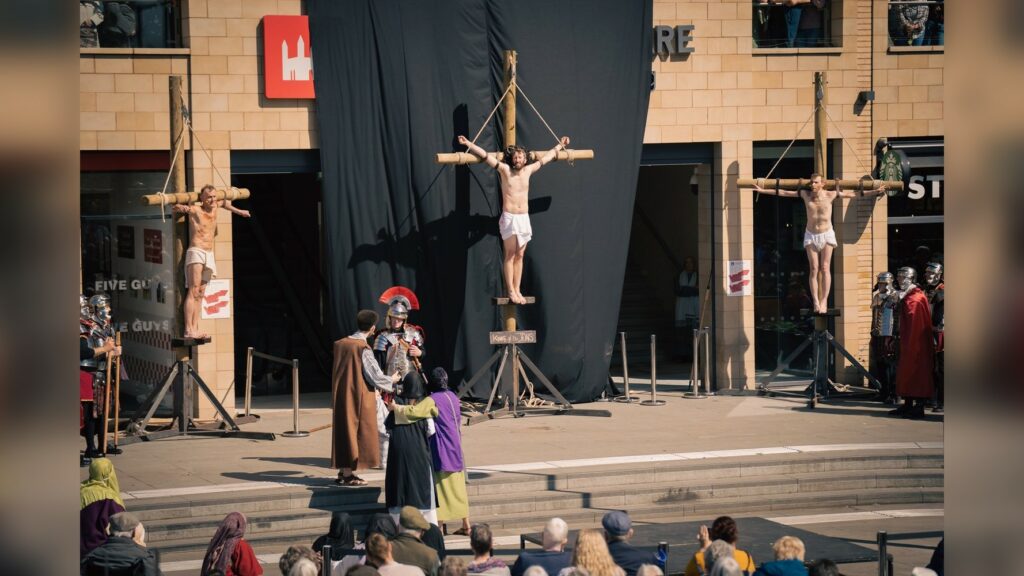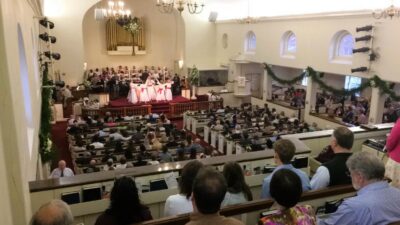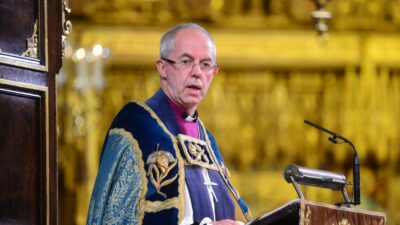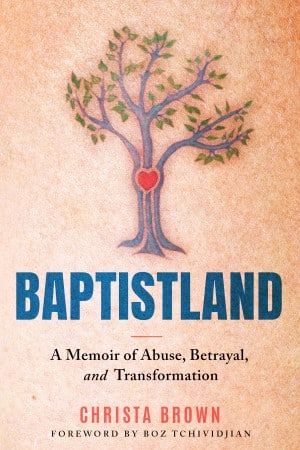Every year, Good Friday sees the unlikely sight of an Anglican bishop being crucified in public as a thief during a Passion Play held near his own cathedral, watched by a vast array of people.
It marks the third time that the Rev. John Inge, bishop of Worcester in the United Kingdom, has taken on the role of the bad thief who curses Jesus.
“People are surprised to see a bishop being crucified, but find it inspiring,” he said. “Passion Plays are a great way of looking at the gospel and bearing witness. It is a huge privilege for me, and a real community event with people from all churches taking part. I felt it would be inappropriate for a bishop to be cast as Jesus. Being able to play the bad thief for the third time, I am very blessed to be involved.”
He added: “As the bad thief I have fewer lines to learn and this makes it easier to play because of my busy diary. The past two years it has been quite warm, so it has been easier to play dead when you are stripped and fastened to the cross.”
Such Easter pageants have become an increasingly frequent sight on Good Friday around the world. The idea dates back to the Middle Ages when town guilds performed individual scenes telling the story to a mainly illiterate audience, resulting in the creation of famous cycles such as the York Mystery Plays and the Chester Miracle Plays.
Your tax-deductible gift helps our journalists report the truth and hold Christian leaders and organizations accountable. Give a gift of $30 or more to The Roys Report this month, and you will receive a copy of “Baptistland: A Memoir of Abuse, Betrayal, and Transformation” by Christa Brown. To donate, haga clic aquí.
Although these public events are still performed on an irregular basis, it was over a decade ago that the first contemporary Passion Plays began to be staged in the U.K. Winterthall, a U.K.-based theatre company, set out to give a “gift to Londoners and visitors” in the form of a monumental Passion Play held in Trafalgar Square. It was immediately successful.
In 2011, Queen Elizabeth II awarded the Winterthall cast and crew the Queen’s Award for Voluntary Service in recognition of its work. All the actors in the 100-strong cast are amateurs apart from the person playing the role of Jesus.
Held on Good Friday, Winterthall’s Passion Play now attracts audiences of over 20,000 as well as being streamed live to hundreds of thousands more worldwide. The play depicts the arrest, trial, crucifixion and resurrection of Jesus.
“It is free to all who come,” said Finola Coltman, who helps organize the event. “We do struggle with the cost of putting it on in this iconic location and yet we have managed to always offer it for free. We supply a very big video screen so that everyone can see the action wherever they are in the square. Many people do not know the story and this is a way they can learn the Christian story. The audience are immersed in the story and see it brought to life in a new and unique way.”
The Worcester Passion Play is based on the Winterthall version. Putting it on involves considerable commitment from the participants, most of whom are from local churches.
Elsewhere in the United Kingdom, the charitable Passion Trust has played a prominent role in developing and encouraging the role of Passion Plays. In all, there will be some 15 Passion Plays happening in town and city centers around the U.K. — and more in churches and schools — with many attending in person or seeing clips later on social media.
A core team of experienced actors work with volunteers and community groups, including disadvantaged people to put on each performance.
Watching the story of the Passion unfold in such dramatic retellings is undoubtedly helping many people in the audience to understand the message of Easter. As a result, Coltman said “many (attendees) are moved to tears.”
Asked about the importance of Passion Plays, Bishop John Ings said, “It has had a powerful effect on the community, with churches working together and the opportunity to learn from each other in a long lasting effect. The Passion Play sees communities and churches coming together. It is very different from anything I have done in the past. I feel I am very lucky to be able to bear witness in such a very effective way.”
Esta historia fue publicada originalmente por Religión desconectada.
Angela Youngman is a freelance journalist who has written for a wide range of national and international publications.





















4 Respuestas
So much of Christianity’s biblical understanding is severely lacking.
Yeshua could not have died on Friday. HE specifically said “as Yonah was in the belly of whale for 3 days and 3 nights”, so it shall be for the son of man in the grave. Mathew 12:40. How can it be 3 days and 3 nights IF HE died on Friday?
I will not go over the details, but if you diligently work backwards from the information that is given according to synoptic gospel accounts, Yeshua died on Passover day; which properly aligns with a Thursday before sundown which counts as day 1; which makes it 3 days, 3 nights.
Here is a summary:
Sundown Wednesday: last supper, prayer with disciples, arrested, taken to chief priests, Peter denies.
Early Thursday (Pesach/Passover): taken to Pilate, condemned, crucified. Died by 9th hour (3p).
Before Sundown Friday= preparation day; already dead, body taken down, & buried.
Saturday: Yeshua dead; kohen (priests) asks for secured grave.
Sunday am: most likely arose round 3am thereabouts = 1st day Sunday being the first fruit to rise from dead. It makes sense HE would “rest” all day on Shabbos.
Sunday am: women find tomb empty around 6am?
Would you please provide the link to the information?
My understanding is:
Tuesday night sundown Jesus had Passover
Wednesday morning after midnight Jesus was arrested (work allowed)
Crucified Wednesday morning and died (work allowed)
Wednesday Jesus was buried before the start of the First Day of the Unleavened Bread (High Day)
High Day begins Wednesday evening (no work allowed)
High Day lasts until Thursday evening (no work allowed)
Friday morning women go to buy spices for Jesus’ body and prepare the spices (work allowed until evening)
Have to stop later that day because Sabbath begins Friday evening (no work allowed)
Saturday Sabbath until evening (no work allowed)
Sunday morning the women go to the empty tomb
Wed evening to Thursday evening 1st
Thursday evening until Friday evening 2nd
Friday evening until Saturday evening 3rd
Raises Sunday morning sometime after midnight
I find it interesting this timeline was never taught to us by the church, or christian schools in the 70’s and 80’s.
Gracias,
EN
I am familiar with both of these timelines.
However, I think we should refrain from criticizing others (or Good Friday productions) based on this detail. Believing He died on Thursday vs Friday is a disputable matter that can distract us from spreading the news on WHY He died – and ultimately rose again. THAT is the gospel. Whether He died on a Monday, Tuesday, Wednesday, Thursday or a Friday, the point is He rose on the third day.
“However, I think we should refrain from criticizing others (or Good Friday productions) based on this detail.”
Where is the criticism of Good Friday productions, or others, in the discussion?